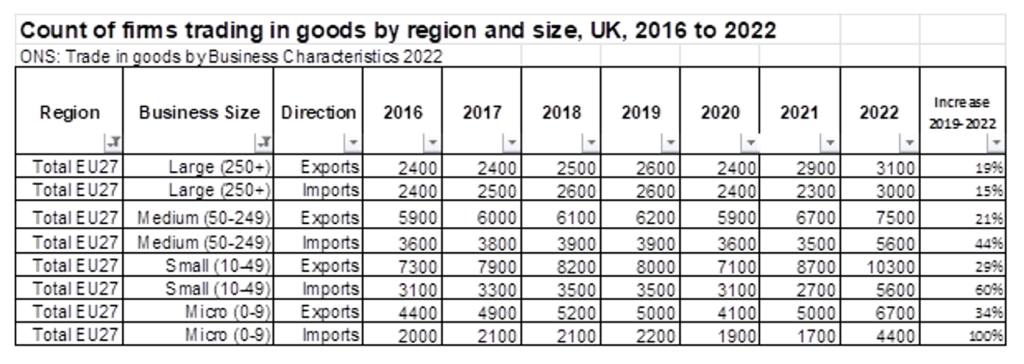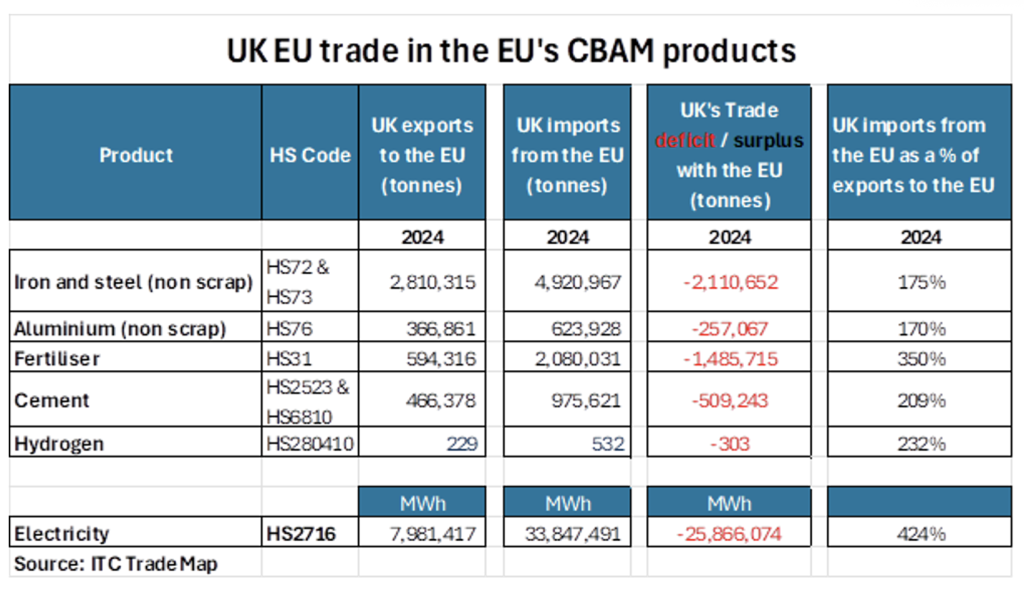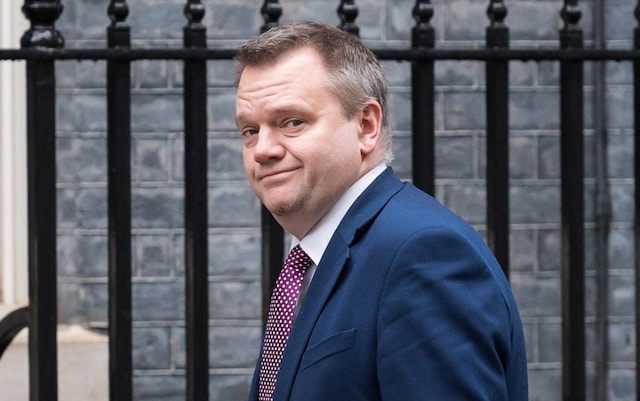Last week, Nick Thomas-Symonds, Minister for the Constitution and European Union Relations, gave a speech for The Spectator on the EU Reset in the Library Room in the Unherd Club in Westminster. I wasn’t able to attend, but you can find a transcript of the speech here or listen to it on YouTube.
Thomas Symonds is a lawyer and historian who has written books on Harold Wilson and Clement Attlee. He began and ended his speech with incredibly misplaced quotes by Harold Wilson.
To begin, Thomas-Symonds claimed that Wilson believed ‘the key was honesty – telling the public the facts, not exaggerating’ in relation to the debate about joining the European Economic Community in the 1970s.
Thomas Symonds then ignored Wilson’s advice and instead used the rest of his speech to lie about who would make the rules and be the arbiter of any transgressions in the EU reset; exaggerate the costs of trading with the EU; mislead the audience about the reductions in UK trade; distort the benefits to UK trade of allowing the EU to make the UK’s food, farming, and agricultural regulations; and trivialise the detrimental impact on UK industry of adopting the EU’s carbon emission and carbon border taxes.
It was a soft soap speech to placate The Spectator audience about the EU Reset and reassure them that there was nothing to see here.
Telling the public the facts
While I acknowledge that it is challenging to explain the intricacies of trade data in a speech, Thomas-Symonds, a lawyer, agreed to the Common Understanding with the EU in May, so he should understand the legal powers he has handed to the EU. You can read this document here. It is very clear about dispute resolution. Thomas-Symonds claimed in his speech that ‘any dispute will go to international arbitration. It is not the European Court of Justice (ECJ) that has the final judgement.’
Unfortunately for Thomas-Symonds the words International Arbitration do not appear in the Common Understanding document, but the words European Court of Justice do, several times; the EU states in paragraph 29 that the ECJ will be the ultimate authority in any SPS Agreement disputes:

The ultimate authority of the ECJ in any dispute resolution is reiterated again in paragraph 43 regarding the UK’s adoption of the EU’s emission trading taxes and the application of the EU’s carbon border adjustment mechanism taxes on UK imports:

Screenshot
And let’s be clear: all of the rules and regulations referred to in the Common Understanding are now, and will be in the future, European Union Laws. If the EU is to abide by new rules, they will be codified in EU legislation and thus subject to interpretation and enforcement by the European Court of Justice.
Thomas-Symonds also falsely claims in his speech that ‘[the UK] will have decision-shaping rights when new EU policies are made and parliament will rightly have a say on those rules’. However, the Common Understanding document clearly states in paragraphs 26 and 27, shown below, that the UK would be required to adopt and immediately apply all relevant EU rules on plant and animal health, food safety, consumer protection, animal welfare, pesticides, and organic products. At no point does it suggest that the EU would ever consider following the UK’s agricultural, food, or trade regulations, despite the UK having more stringent animal welfare rules and a more favourable approach towards pesticides and modern agricultural processes such as gene editing.

The EU has deigned to allow the UK to ‘contribute appropriately for a country that is not a member of the European Union’, but the Common Understanding does not say what the EU would consider to be an appropriate contribution from a non-member. As the UK’s ‘contributions’ were generally voted down when we were full EU members, the EU is even less likely to accept UK contributions now that it is a non-member.
I suspect the only contribution from the UK that the EU cares about is a financial one. The demand for financial contributions from the UK to the EU appears three times in the Common Understanding document agreed upon by Thomas-Symonds: first in the discussion of the youth mobility scheme (paragraph 14), which includes mobility for ‘studies’ meaning EU students attending UK universities, then in relation to the SPS Agreement (paragraph 32, shown below), and again concerning the Emissions Trading Scheme (paragraph 42). However, Thomas-Symonds’ speech did not mention any of these financial demands.

If the UK is truly to have an input into the EU’s regulation-making process of the ‘common SPS Area’ as Thomas-Symonds claimed in his speech, why does the Common Understanding agreement, signed by Thomas-Symonds in May, only mention a payment from the UK to the EU for the ‘EU’s policy work’? The lack of a fee makes it obvious that there will be no UK ‘policy work’; this was just another lie to placate his audience. Thomas-Symonds should have followed Wilson’s advice and been honest: The UK will adopt all EU regulations. Without discussion or debate. End of.
Subjugation wearing trade agreement clothing
Although Thomas-Symonds is a lawyer, he may not have read any trade agreements, so his claim that ‘all international trade agreements involve shared rules’ may not be a lie but rather a reflection of his limited knowledge of trade agreements. However, his limited knowledge of trade agreements is also why he should not be in charge of negotiating the UK-EU Reset, and probably why the Common Understanding agreed by Thomas-Symonds is not a mutually beneficial arrangement but a subjugation of the UK by the EU.
Thomas-Symonds should know that trade agreements do not involve ‘shared rules’. More importantly, he should have noticed that the Common Understanding does not include ‘shared rules’ either; it requires the UK to blindly follow EU rules. And to do so immediately.
The UK has trade agreements with 72 countries, none of which require the UK to follow the other Party’s laws in its domestic legislation. Only exported goods must meet the other Party’s standards, just as imported goods from that Party must meet UK standards. Trade agreements are not instruments of legal subordination. Even in the UK-EU Trade and Cooperation Agreement (TCA), the UK does not follow EU laws. Both the UK and the EU must avoid significant divergence in areas such as labour laws or state aid; however, this is enforced through rebalancing mechanisms rather than through legal adoption.
It is strange that Thomas-Symonds, a lawyer, would praise the UK’s trade agreements with India and the US in his speech and hope that his audience would somehow believe that the UK had adopted both countries’ rules in order to reach those agreements. The man on the Clapham Omnibus would know that this could not possibly be true. I wonder how many in the Spectator audience also recognised this absurdity or realised that Thomas-Symonds must have been lying?
Thomas-Symonds also conflates EU membership with a trade agreement, claiming the UK-EU TCA was ‘the first trade agreement in history to make it harder to trade’. EU membership was much more than just a trade agreement, which is why the UK voted to leave the EU, while also signing a comprehensive trade agreement with the EU. We liked the trade but hated the loss of sovereignty.
Despite Wilson’s claim about honesty being the key, membership of the EEC, and later the EU, was always sold to the UK population by politicians from both parties as simply joining a trade organisation, but the EEC/EU was always about European countries giving up their sovereignty to allow unelected Commissioners to make homogeneous rules for all EU members, regardless of whether it suited their cultures or their economy.
Lies, damned lies, and trade statistics
However, Thomas-Symonds’ speech is not just full of lies that obscure the UK’s legal subjugation by the EU; he has also employed clever juxtapositions to mislead his audience about UK trade.
Thomas-Symonds claimed ‘the 2020 deal [wiped out] our small businesses’, followed by ‘Since 2022, over 16,000 businesses have stopped exporting altogether’. His audience may have thought that the ‘2020 deal’ is connected to the ‘16,000 businesses who has stopped exporting’ since 2022, but neither appears to be true.
The ONS publishes information about UK trading companies by size, based on the number of employees. The most surprising aspect of the ONS report is the low number of companies in the UK that trade with any country, but this is not related to Brexit and was also the case before the EU referendum in 2016. (See the table below)
However, despite Brexit, more companies of all sizes were trading with the EU in 2022 than in 2019, the year preceding Brexit. Small businesses, those with 10 to 49 employees, exporting to the EU, have increased from 8,000 companies in 2019 to 10,300 companies in 2022. While the number of micro companies, those with less than 10 employees, exporting to the EU has increased from 5000 to 6,700. These companies have not been wiped out, as Thomas-Symonds claims, as shown in the table below.

And if 16,000 companies have stopped exporting altogether, then that isn’t apparent in the ONS Figures for companies exporting to all regions, shown below.

If any UK company, large or small, has been ‘wiped out’ since 2019, it is much more likely to be because of:
- COVID-19 lockdowns and factory closures in 2020 and 2021,
- the UK having the world’s highest industrial energy prices,
- the UK’s massive taxes on the oil and gas industry,
- low consumer spending, due to the highest tax burden in 70 years,
- UK commercial interest rates doubling since 2019, and
- UK’s increased taxes on employment.
All of which are caused by UK domestic policies and not related to Brexit or trade. And they won’t be fixed by the Common Understanding.
What really happened to UK trade after Brexit?
But Thomas-Symonds’ biggest whopper was: ‘Exports are down by 20% since 2019,’ which he allows his audience to imagine is due to the UK leaving the EU, and that if the UK blindly adopts EU SPS and ETS rules, UK exports will magically be restored. However, everything is flawed with both his numbers and this assumption.
- UK total exports to all destinations are up by 25% in current prices since 2019.
- If he just meant exports to the EU, then total exports to the EU are up by 20% since 2019, in current prices.
- If he only meant Goods exports to the EU, then they are up by 2% since 2019.
- If he meant only Goods exports to the EU, after adjusting for inflation, then they are down by 18% in CVM since 2019, but not because of Brexit. The significant decline in UK exports to both the EU and the rest of the world has been primarily due to reductions in UK oil, gas and chemical exports.
Chemicals and fuels were the UK’s second and fourth largest goods exports in 2019. However, the UK’s green agenda, its Energy Profits Levy, and its restrictions on developing new oil wells and gas fields have reduced the UK’s ability to export both oil and gas, as well as produce the chemicals made from them. Adopting the EU’s food and agriculture regulations will not increase UK exports of oil, gas and chemicals.
UK exports of clothing and footwear to the EU have decreased since Brexit, as these goods are primarily manufactured in Asia for British companies and are no longer classified as UK exports under the rules of the TCA. UK exports of tropical fruit and nuts are lower because these are re-exported goods grown in Africa or the Caribbean, and are no longer counted as UK exports under the rules of the TCA. Adopting the EU’s food and agricultural regulations will not turn any of these goods back into UK exports.
While a lawyer like Thomas-Symonds may not understand the nuances of trade statistics, he should have read and understood the rules of the TCA. If he hasn’t, then he should not be allowed to reset the UK’s relationship with the EU. If he has read and understood the TCA rules, then he was lying in his speech by implying that the Common Understanding would restore UK trade with the EU.
The Common Understanding, signed by Thomas-Symonds, would not increase UK agri-food exports. The UK has not been self-sufficient in food for at least 200 years. In 2024, only 65% of the food consumed in the UK was produced domestically. The UK imported food and live animals worth £39.5 billion from the EU in 2024, and this is the trade that the EU wants to protect by ensuring that it controls the UK’s food and agricultural import regulations. The Common Understanding has nothing to do with helping UK companies export food to the EU; it is about preventing the UK from importing food from non-EU countries.
Whose costs are they really?
Thomas-Symonds also conflated the costs of businesses exporting food to the EU with the prices that UK shoppers pay. He claimed that an Export Health Certificate to transport food from the UK to the EU costs £200 per consignment but didn’t mention that this charge is determined by the UK issuing authority and can be as low as £60.50 for regular exporters. If the UK government believed that UK authorities were charging too much for these certificates, it could cap the payments rather than force every farmer and food manufacturer in the UK to obey EU regulations, as most of them do not export food to the EU. And those that do, as Thomas-Symonds correctly said in his speech, already make their goods to EU standards because they have to in order to export to the EU. There is no reason to force the rest of the country to follow EU rules; more importantly, there is no reason to force all imported food to comply with EU rules. This will only benefit EU farmers and food manufacturers and increase prices for UK shoppers.
The final nail in the UK’s deindustrialisation coffin
Thomas Symonds also claimed that ‘linking our carbon markets will cut costs for major UK industries and stop British firms paying the EU’s Carbon Border tax.’ This statement is also a limited version of reality. The Common Understanding does not ‘link’ our carbon markets; the UK would join the EU’s carbon market. Nor will this help British industries. If anything, joining the EU’s Emissions Trading Scheme will drive even more UK manufacturers out of business. The EU carbon price is currently €71.72 (£61.96) per tonne of CO2, whereas the UK price ranges from £33 to £38 per tonne.
The UK has a lower carbon price than the EU because it has deindustrialised more quickly and has fewer firms needing to buy carbon allowances. This deindustrialisation has occurred because the UK imposes high environmental and policy-related charges on its industrial electricity, as well as its additional taxes on oil and gas companies, which also push up input prices for downstream industries such as chemicals. The major EU industrial economies, such as Germany, have capped environmental charges and lower network charges for industry. Germany also offers targeted relief on energy taxes to exporters and manufacturers. If the UK joined the EU’s carbon scheme, UK manufacturers would be paying environmental charges twice: once in their electricity bills, and again by paying the EU’s carbon prices. The UK’s average industrial electricity price in 2023 was 25.4p/kWh, while Germany’s average was 15.6p/kWh.
As mentioned above, very few companies in the UK trade internationally; however, all UK manufacturers would be required to pay almost double the current UK carbon price if the UK were to adopt the EU’s carbon price. As for Thomas-Symonds’ claim that this would prevent British firms from paying the EU’s Carbon Border Taxes, he really needs to look at UK imports. The UK imported 175% more steel from the EU than it exported to the EU in 2024, as well as 170% more Aluminium, 350% more fertiliser, 209% more cement, 232% more hydrogen and 424% more electricity. (See the Table below.)
Meanwhile, adopting the EU’s Carbon Border Adjustment Mechanism would make goods imported from non-EU countries more expensive, as they would also be subject to the EU’s high carbon price through this import tax.

A patriotic conclusion dripping in hypocrisy
Thomas-Symonds ends his speech with another misplaced quote from Harold Wilson: ‘He who rejects change is the architect of decay.’
Thomas-Symonds then goes on to claim that he is ‘restoring the freedoms we once had.’ You really couldn’t make this level of hypocrisy up. Thomas-Symonds is rejecting change; he is rejecting the changes brought about by Brexit and returning the UK to the control of the EU and its unelected Commissioners in Brussels. And then claims he is restoring Britain’s ‘freedom’.
As Wilson predicted, it will be Thomas-Symonds who will be the architect of the decay of UK parliamentary sovereignty, UK industry, UK farming, UK borders, and UK industrial jobs in the Labour-supporting heartlands. But I am sure the urbane Spectator readers sitting in the Library Room of the Unherd Club in Westminster lapped up Thomas-Symonds’ speech without questioning any of it. Labour really has become the party of the lanyard class.
Catherine McBride OBE is an economist and a former member of the UK’s Trade and Agriculture Commission, an independent body tasked with scrutinising the UK trade agreements.
Related

